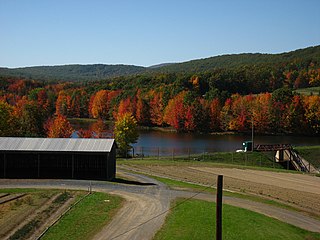
Gregg Township is a township in Centre County, Pennsylvania, United States. It is part of the State College, Pennsylvania Metropolitan Statistical Area. The population was 2,287 at the 2020 census.

Andrew Gregg Curtin was an American lawyer and politician. He served as the 15th governor of Pennsylvania during the American Civil War, helped defend his state during the Gettysburg Campaign, and oversaw the creation of the National Cemetery and the ceremony in which Abraham Lincoln delivered his famous Gettysburg Address.

Andrew Gregg was an American politician. A Democratic-Republican, he served as a United States Senator for Pennsylvania from 1807 until 1813. Prior to that, he served as a U.S. Representative from 1791 until 1807. From June to December 1809, he served briefly as President pro tempore of the United States Senate.

Francis Thomas was an American politician who served as the 26th Governor of Maryland from 1842 to 1845. He also served as a United States Representative from Maryland, representing at separate times the fourth, fifth, sixth, and seventh districts. He also served as United States minister to Peru from 1872 to 1875, and speaker of the Maryland House of Delegates in 1829.

William Irvin Swoope was an attorney and politician from Clearfield, Pennsylvania. A Republican, he served as a member of the United States House of Representatives from 1923 to 1927.

Seth Hartman Yocum was a Greenback member of the U.S. House of Representatives from Pennsylvania.

James H. Osmer was a Republican member of the U.S. House of Representatives from Pennsylvania.

James Tracy Hale was a Republican member of the U.S. House of Representatives from Pennsylvania.
John Blanchard was a Whig member of the U.S. House of Representatives from Pennsylvania.
George McCulloch was an American politician who served as a Democratic member of the U.S. House of Representatives from Pennsylvania.
Charles McClure was a Democratic member of the U.S. House of Representatives from Pennsylvania.
William Simonton was a Whig member of the U.S. House of Representatives from Pennsylvania.

Charles Ogle was an Anti-Masonic and Whig member of the U.S. House of Representatives from Pennsylvania.

George May Keim was a Democratic member of the U.S. House of Representatives from Pennsylvania.
Joseph Lawrence was a member of the U.S. House of Representatives from Pennsylvania.
David Petrikin was a Democratic member of the U.S. House of Representatives from Pennsylvania.
John Mitchell was a member of the U.S. House of Representatives from Pennsylvania.
Thomas Burnside was an American politician and judge who served as a Democratic-Republican member of the United States House of Representatives for Pennsylvania's 9th congressional district from 1815 to 1816 and as an associate justice of the Supreme Court of Pennsylvania from 1845 until his death in 1851.

The 1926 United States Senate election in Pennsylvania was held on November 2, 1926. Incumbent Republican George W. Pepper, who was appointed following the death of Boies Penrose, was defeated for re-nomination by William Scott Vare. Vare won the election, defeating Democratic opponent William Bauchop Wilson. He was not permitted to assume office, however, until an investigation was conducted into possible election fraud and corruption. Vare was ultimately unseated in December 1929 by the Senate, following charges of corruption.

On November 20, 1839, a special election was held in Pennsylvania's 14th congressional district to fill a vacancy caused by the death of William W. Potter (D) on October 28 of that year, before the start of the first session of the 26th Congress.
This page is based on this
Wikipedia article Text is available under the
CC BY-SA 4.0 license; additional terms may apply.
Images, videos and audio are available under their respective licenses.











